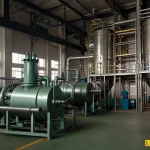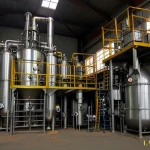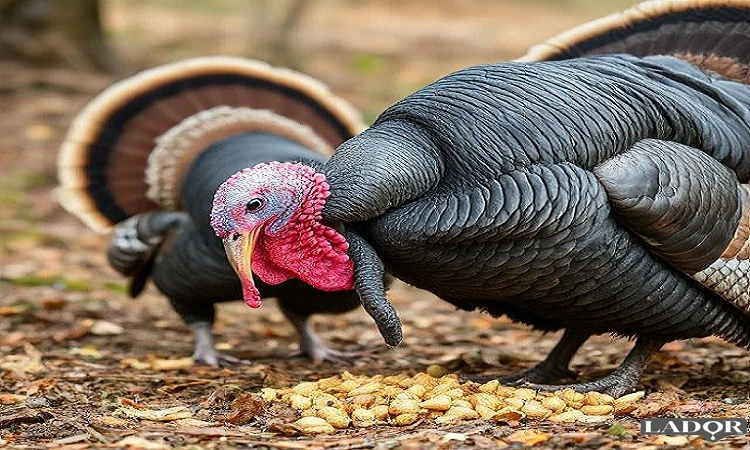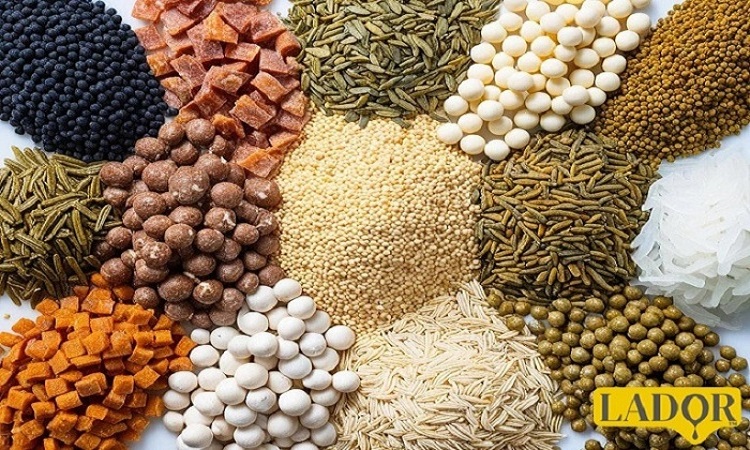

Optimum feeding of turkey is one of the most important factors for successful and profitable breeding of this bird. A balanced and complete feed ration not only ensures rapid growth and weight gain for turkeys but also increases their resistance to diseases and leads to better meat and egg quality. Careful nutritional planning, considering the age, breed, and purpose of farming (meat or egg production), helps maximize efficiency. In the following article from Ladorfat, we will explore the best food for turkeys.
Turkey feed is prepared by combining several raw ingredients in specific proportions to meet all the bird’s nutritional needs. These main components include:
They are the primary source of energy for turkeys. Corn and wheat are the most important carbohydrate sources in their diet.
Essential for growth and tissue repair. Soybean meal, fish meal, and legume seeds are the main protein sources. As turkeys age, their protein needs decrease while their energy needs increase.
Crucial for providing energy, absorbing fat-soluble vitamins (such as A, D, E, and K), and protecting internal organs. Vegetable oils like soybean and sunflower oil, as well as animal fats like poultry oil, are good sources of fat.
These micronutrients are vital for proper body function, strengthening the immune system, and bone health. Vitamin and mineral supplements, available as concentrates, meet these needs.
Salt is necessary for electrolyte balance, and calcium is essential for bone strength and eggshell production in laying turkeys. Calcium carbonate and dicalcium phosphate are common calcium sources.

There are different types of turkey feed, which are categorized based on their age and stage of growth:
Used for turkey poults during their first few weeks of life. This feed has a high protein content and a very fine, or even powdery, consistency to make it easy for young poults to digest.
Designed for growing turkeys after the starter phase. The protein level in this feed is lower than starter feed, and its energy content is higher.
Used for turkeys nearing market weight. At this stage, protein is minimized and energy is maximized to achieve optimal weight gain and fat accumulation.
Formulated for breeding or egg-laying turkeys. This feed contains high levels of vitamins, minerals, and calcium to ensure the health of the bird and the quality of the eggs.
Using commercial prepared feed has several benefits for breeders:
Nutritional Balance: These feeds are formulated based on scientific research and the specific needs of turkeys at each growth stage, providing all the essential nutrients.
Time and Labor Savings: Preparing feed on the farm is difficult and time-consuming, while using prepared feed simplifies the process.
Reduced Risk of Human Error: Industrial feed formulation is done by nutrition experts, minimizing the risk of human error in mixing ingredients.
Increased Productivity: Accurate and balanced nutrition leads to better growth, reduced losses, and consequently, higher profitability.
Improper feeding, whether it is a lack of nutrients or an imbalance in their ratio, can have serious and irreparable consequences for the health and productivity of turkeys. Some of the most important of these effects are:
A lack of protein, energy, or vitamins can cause a reduction in the growth rate and severe emaciation in turkeys.
Deficiencies in vitamin D, calcium, or phosphorus can lead to bone and joint deformities. Affected turkeys have difficulty walking and may even become paralyzed.
A lack of manganese and certain B vitamins can cause an Achilles tendon dislocation and twisted legs.
Calcium and vitamin D deficiencies in breeding turkeys can reduce egg production and lead to the creation of thin-shelled or even shell-less eggs.
Poor nutrition, especially a lack of vitamins and minerals, weakens a turkey’s immune system, making them susceptible to various diseases.
Feather loss or ruffled feathers, discoloration of the beak and legs, and a generally unkempt appearance can be signs of malnutrition.
Deficiencies in certain vitamins, such as vitamin E and thiamine (B1), can lead to neurological disorders like loss of balance, head tremors, and muscle weakness.
Ultimately, severe malnutrition can lead to various diseases, reduced resistance to stress, and increased mortality in the flock.

A’la oil Sepahan Company, which markets its products under the brand name Lador, is one of the pioneers in producing raw materials for livestock and poultry feed in Iran. The company utilizes modern technologies and a team of experts to produce various high-quality fats for use in the livestock and poultry industries. One of Ladorat’s main goals is to supply the necessary energy and fat sources for the production of commercial feeds.
Ladorfat produces its products to the highest quality standards, holding the necessary health permits from the Iran Veterinary Organization and international standards. The company guarantees that all products are produced in accordance with precise analyses and the required standards for animal nutrition, thanks to its well-equipped laboratory. Ladorfat extensive research and development approach has made it one of the most reputable suppliers in the industry.
Turkey nutrition is a complex and specialized process that requires attention to detail and the use of high-quality raw materials. The precise combination of carbohydrates, proteins, fats, vitamins, and minerals ensures the healthy and rapid growth of turkeys. Companies like A’la oil Sepahan play a significant role in facilitating this process for breeders by producing high-quality raw materials. The use of these companies’ specialized products greatly helps improve productivity, reduce costs, and ultimately lead to success in the turkey farming industry.
Ladorfat offers a variety of products for the livestock, poultry, and industrial sectors. Some of these products include: pure fat powder, Omega-3 fat powder, livestock fat in cans, and hydrogenated soybean oil. The company is also active in producing raw materials for livestock and poultry feed, such as horse feed, feed for native egg-laying chickens, and Golpayegan chicken feed, among others.